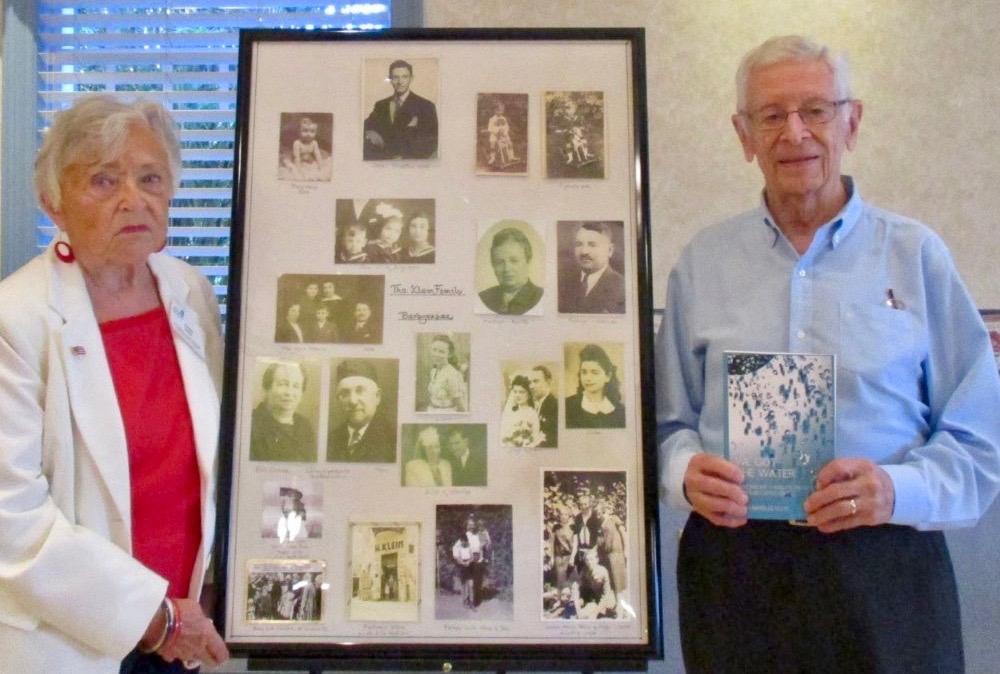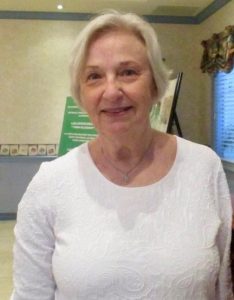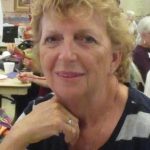Holocaust survivor Gene Klein put a human face on his self-described “year in hell” when he described his life as a 16-year-old boy, and the year he spent in Auschwitz and two other camps before being liberated at the end of World War II.
As the invited speaker for the Sumter County American Association of University Women monthly meeting on Saturday, Klein told the rapt audience of members and guests the story of his life before during and after being forced to live in labor camps.

Klein described his early life as typical of a middle-class kid growing up in a Hungarian Jewish household. He had two older sisters, played soccer and had fond memories of his family being at the Temple. During his early teen years he was required at school to select two languages. He selected German and Italian.
“I did not know at the time this choice was an important life gift,” said Klein, now a resident of the Village of Duval.
Things began changing quickly.
Klein remembered being at school and the teacher announcing that all the Jewish children should not return on Monday. Soon after, Jewish families in his area were put on trains, packed into cattle cars, for a three-day journey, unknown to them at the time, to Auschwitz.
Upon arrival Klein saw SS Troopers for the first time. Men and women were separated. This was the last time he saw his mother and sisters until after the war.
There was a man standing before the crowd with a riding crop pointing at people and then pointing right or left. He was sent in one direction and his father was sent in another. He was stripped of his clothes and name, forced to put on a uniform and become a number. Desperately trying to figure out what happened to his father, he found a polish prisoner who had been at the camp for a while, who spoke German and asked him what he thought might have happened to his father.
“This man walked me outside and pointed to a rectangular building with smoke billowing out and he said, as calmly as though we were talking about the weather, your father is going up the chimney,” said Klein.
“My 16-year-old brain woke up and became an adult,” he said.
From Auschwitz he was sent to a labor camp where life consisted of excruciatingly hard lard labor and little food. Walking around the bodies of dead prisoners became the norm. People were worked to the point of death because there was always another train arriving with more prisoners.
Klein often thought “What can I tell myself to keep going?” He came up with two things that he told himself every night and every morning. Although he had no proof, he believed his mother and sisters were alive and he had to stay alive for them. If he died, the SS won and he was not going to let that happen.
Knowing German again became important in his life. Klein was assigned to assist a civil engineer for what he calls “a two-week vacation” because he was relieved from the daily labor. But the engineer, at risk to his own life, hid food for Klein to eat on his way back to the camp each night. Klein became emotional at this point in the story. He would drink the milk and sneak the food back in the camp to share with his two friends.
The prisoners were moved to another camp. Although Klein was suffering from a severe gash on his leg he joined the walkers, savvy enough now to know that those riding on the truck were never going to arrive at a new destination.
Arriving in the new camp there was no work and little food.
“Basically we had come there to die,” said Klein. Many did die there, being dumped in mass graves. “The death rate was horrendous,” said Klein.
One morning the prisoners noticed there were no guards in the towers. Upon further exploration they realized there were no guards anywhere, they had vanished. Braving their way to the fences they saw a soldier with a red star coming their way. Klein knew it was a Russian soldier and realized this meant they were free. The Russian soldiers showed up with doctors, medicine and food.
Transported again on the cattle cars of a train, but this time as survivors a woman recognized him and let him know that his mother and sisters were alive. Klein arrived in America in 1947. He was drafted in 1952 and because of his fluency in German spent two years in military intelligence and received his U.S.citizenship. He met and married his wife Barbara in 1957. They recently celebrated their 60th wedding anniversary. Living most of their married lives in Miami, they now live in The Villages. Their daughter Dr. Jill Klein has put together the family’s story in a book titled We Got the Water. She and her father speak internationally to audiences on the topic of resilience.

Linda Carpenter had heard Klein speak before “and I was completely knocked out. I have read the book, but I had to read it in small pieces it was very powerful.”
Ruth Martin, a psychologist, was amazed at his inner-strength.
“I am Jewish and I found his story very moving. In my practice I had many patients that were survivors that did not fare as well. His strength and ability to live is phenomenal. He is a survivor with a capital S,” she said.

Audience member Jan Lessard, a former teacher of holocaust literature, asked Klein how he assimilated back into regular life.
“I am in the very small percentage of survivors that can put the memories in a cubby hole. I talk about with groups and then I put it away. I made a decision when I was first liberated that I would not let this experience destroy me. If I did, the SS wins,” he said.

